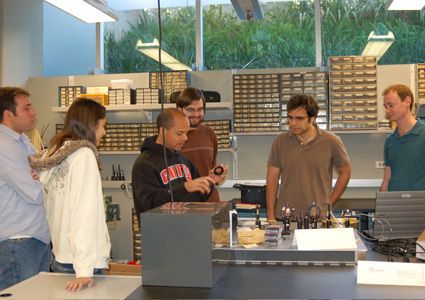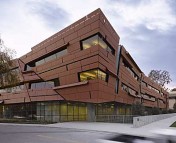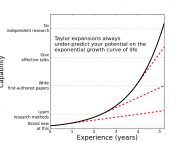This is the last of three conversations with John Johnson that we are posting this week. If you missed them, be sure to read his perspective on graduate admissions and his advice for success in undergraduate research.
If you’re a long-time Astrobites reader, I’m sure you remember the two excellent guest posts that John Johnson, Assistant Professor of Astronomy at Caltech, contributed last year (here and here). John recently founded the ExoLab at Caltech. We were lucky enough to have John visiting us at the Center for Astrophysics recently and we sat down to discuss his new lab.
I have a little trouble defining John’s new exoplanet research group at Caltech, even (especially) after watching him give an hour-long talk about it. The ExoLab is a place where undergraduates, graduate students, and post-docs combine their “mathematics street fighting skills” to attack novel problems… It’s a place where you can dream up and build, using mass-produced parts, your own planet-finding observatory. .. Is that clear?
What makes it hard to define is that the “lab” research model just isn’t used in astronomy. The dominant mode for research in astrophysics is a small group, usually consisting of a professor and one or more graduate students or post-docs. A “big group” at most institutions might imply four graduate students. We take this research style for granted in the field, but this is actually starkly different than how science operates in many other disciplines. There’s nothing unusual about a group consisting of several dozen researchers in biology or chemistry; they call these labs.
John describes realizing the benefits of this research model when he arrived at Caltech and toured a sprawling lab that took up an entire floor of the Chemistry building. He recounted watching someone train two of his labmates on a sophisticated piece of equipment; in this case, the expert was an undergraduate, and he was teaching a grad student and a postdoc. He liked the idea of a collaboration where everyone contributes a piece of expertise, and everyone benefits from others’ experience.
The ExoLab currently has an almost exactly-even mix of undergraduate, graduate students, and postdocs. They combine experience not only from exoplanet research, but from other areas of observational astronomy, instrumentation, and even aerospace engineering and science writing. John champions the collaboration between this group by example. He says the idea for the MINERVA facility was born out of a casual exercise at a group meeting to figure out what might be the most efficient way to implement the radial velocity method for planet hunting.
Of course, a lab presents problems, as well. As the group an advisor oversees grows, the attention he or she can spend with each student inevitably decreases. John says he makes a rule of spending at least 30 min. with each student per week, and they try to meet as a group a couple times per week.
Moreover, he acknowledges that joining a group will be intimidating for new students (particularly the Freshman undergraduates). He’s essentially inviting them in to a discussion group on a topic they haven’t yet learned anything about, where every other member is already a leading authority on the subject. But John argues that, like learning a foreign language, total immersion is the best way to get up to speed. After a few months, he tells his students, they will feel comfortable participating in group discussions and playing their role in the research; they will learn the language.
We thank John for sharing his time and wisdom. Are you looking for more information about graduate school in astronomy? Check out all the articles linked in our Graduate School Guide.




